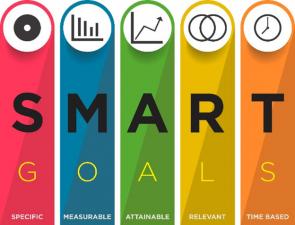In this comprehensive guide, we explore how attorneys and law students can effectively use SMART goals—Specific, Measurable, Achievable, Relevant, and Time-bound—to navigate their career paths and achieve success in the legal industry. By emphasizing the importance of tailoring career objectives to the dynamic legal job market, setting measurable benchmarks for academic and professional development, and committing to continuous improvement through mentorship and networking, this article offers invaluable insights into utilizing SMART goals for advancing legal careers. Whether aiming for a specialization, enhancing legal skills, or securing a coveted position, our detailed exploration provides a structured approach for legal professionals to set, pursue, and achieve their career goals, ensuring long-term success and fulfillment in the competitive legal landscape.

In the competitive and ever-evolving legal industry, attorneys and law students are continually seeking ways to differentiate themselves and advance their careers. Setting goals is a fundamental step in this journey, but not all goals lead to success. This is where SMART goals come into play, offering a framework for setting objectives that are Specific, Measurable, Achievable, Relevant, and Time-bound. This article delves into how utilizing SMART goals can guide legal professionals and students towards achieving their specific targets, with a focus on navigating the legal job market and enhancing career development. To see how this framework applies directly to legal professionals, explore our guide on Mastering Specific Goal-Setting Techniques for Attorneys and Law Students: The SMART Approach.
SMART Goals for Legal Careers
The SMART acronym stands for Specific, Measurable, Achievable, Relevant, and Time-bound—each a crucial element in crafting effective and actionable goals. For law students and attorneys, the SMART framework is not just a tool but a roadmap to success. It helps in breaking down the overarching ambition of thriving in the legal field into manageable, targeted actions. For a deeper dive, review Setting Strategic Goals for Legal Excellence: A SMART Approach for Attorneys and Law Students to understand how SMART applies across law career stages. Here’s why setting SMART goals is indispensable in legal career advancement:
- Specific: Zeroing in on precise objectives.
- Measurable: Setting benchmarks to track progress.
- Achievable: Ensuring goals are realistic.
- Relevant: Aligning goals with career aspirations.
- Time-bound: Establishing deadlines to foster accountability.
See Related Articles:
- Why You Must Constantly Set Bigger Goals
- Setting Strategic Goals for Legal Excellence
- How SMART Goals Can Accelerate Your Legal Career
Setting Specific Goals in Your Legal Job Search
The first step in any successful legal job search is to define what you're looking for. Whether it’s landing a position at a top law firm, specializing in a particular area of law, or securing a coveted judicial clerkship, specificity is key.
- Identify Your Niche: Start by researching various legal fields and positions. Are you drawn to corporate law, or does criminal defense pique your interest?
- Tailor Your Application: Customize your resumes and cover letters for each application. Highlight experiences and skills that align with the job’s requirements. See how these principles work in practice in Achieving Your Career Goals at Stroock & Stroock & Lavan, which offers insights into law firm goal-setting.
Measurable Achievements in Legal Education and Career
Measurable goals allow you to track your progress and adjust your strategies as needed. For law students, this could mean aiming for a specific GPA or securing internships each summer. Attorneys might set goals for billable hours or number of cases won.
- Academic and Professional Benchmarks: Set clear performance metrics, such as achieving honors in your coursework or contributing to legal publications.
- Skill Development: Aim to improve specific legal skills. For instance, commit to attending a certain number of networking events or completing additional training in legal research. For more on how measurable objectives impact career growth, read 7 Effective Tips for Attorney Performance Evaluations.
Achievable Aspirations for Law Students and Attorneys
While ambition is important, setting realistic goals is crucial for sustained progress. Consider the current legal job market and your personal circumstances when setting your goals.
- Market Trends: Stay informed about the demand in different legal fields. For example, data privacy law is a growing field with increasing job opportunities.
- Step-by-Step Approach: Break down long-term goals into smaller, manageable objectives. Gradually build your qualifications and experience to reach your ultimate career goals. Clear, achievable career goals also strengthen job applications—explore this further in the Resume Review Workshop Transcript.
Relevance of Goals in the Legal Profession
Setting goals that are not only achievable but also relevant to your career aspirations and the needs of the legal industry is crucial. Relevance ensures that your efforts are directed toward objectives that will genuinely advance your career and contribute to your professional fulfillment.
- Career Objectives Alignment: Make sure your goals align with your long-term career vision. For instance, if you aspire to become a human rights lawyer, seek out internships, volunteer work, and coursework that build relevant expertise and connections.
- Networking and Mentorship: Leverage professional relationships for guidance and feedback on your career path. A mentor in your chosen legal field can offer invaluable insights into setting relevant goals and achieving them. Relevance also means avoiding common missteps—see Making Smart Decisions in Law Firms: Avoiding Common Mistakes for Success.
Time-bound Planning for Law Career Advancement
A critical aspect of the SMART framework is setting deadlines. Time-bound goals create a sense of urgency and motivate you to prioritize tasks, making it easier to track progress and maintain momentum in your career development.
- Timeline for Job Search Activities: Outline a schedule for your job search process, including when to apply for internships, clerkships, or bar exams. This ensures you are taking consistent, timely steps toward securing employment.
- Certifications and Specializations Deadlines: If you aim to specialize in a particular area of law, set deadlines for completing necessary certifications or educational requirements. This could include enrolling in specialized courses or attending relevant legal workshops. Discover how timelines fast-track progress in How SMART Goals Can Accelerate Your Legal Career.
Utilizing SMART Goals for Continuous Improvement
The legal profession requires a commitment to lifelong learning and continuous improvement. SMART goals can help you stay focused on growth, ensuring that you are always moving forward in your career.
- Reflect on Past Goals: Regularly review the goals you've set and achieved. Analyze what worked, what didn’t, and how you can adjust your strategies moving forward.
- Set New, Challenging Objectives: Based on your reflections and the evolving landscape of the legal industry, set new goals that push you out of your comfort zone and into new areas of growth and opportunity. Continuous improvement is about pushing beyond limits—explore this idea in Why You Must Constantly Set Bigger Goals.
For attorneys and students applying this model in the legal profession, setting strategic goals for legal excellence offers a field-specific perspective on how SMART goals translate into lasting career success.
Conclusion: Achieving Legal Career Success with SMART Goals
In conclusion, the SMART framework offers a structured and effective approach to setting and achieving career goals in the legal field. By ensuring that your goals are Specific, Measurable, Achievable, Relevant, and Time-bound, you can navigate the complexities of the legal job market with confidence and clarity. Whether you're a law student just starting out or an experienced attorney looking to advance your career, SMART goals can guide your journey toward professional success and satisfaction. Patent attorneys can apply SMART goals to navigate market changes and career growth—see the comprehensive guide for patent attorneys in 2025.
- Embrace Continuous Learning: The legal field is constantly changing, and staying informed about new developments and trends is crucial. Use SMART goals to foster a habit of continuous learning and adaptation.
- Adjust Goals as Needed: Be prepared to refine your goals as you gain more experience and as the legal industry evolves. Flexibility and resilience are key to long-term success in law.
By integrating the principles of SMART goal-setting into your career planning, you're not just setting targets; you're paving a pathway to achieve your professional aspirations in the legal world. Stay committed, stay focused, and let your SMART goals lead you to the success you envision.
1. What is the SMART framework, and how can it benefit legal professionals in their career advancement?
Answer: The SMART framework stands for Specific, Measurable, Achievable, Relevant, and Time-bound goals. It benefits legal professionals by providing a structured approach to setting clear, attainable objectives that align with their career aspirations, enabling them to systematically track progress, adjust strategies, and achieve success in the competitive legal industry.2. How can law students and attorneys ensure their goals are specific and beneficial to their legal careers?
Answer: Law students and attorneys can ensure their goals are specific and beneficial by clearly identifying their niche or desired positions within the legal field and tailoring their application materials accordingly. This involves researching various legal sectors, understanding market demands, and customizing resumes and cover letters to reflect the skills and experiences relevant to their targeted job listings.3. Why are measurable achievements important in legal education and career progression?
Answer: Measurable achievements are crucial because they allow individuals to track their progress towards their goals, providing tangible benchmarks for academic performance, skill development, and professional milestones. This quantifiable approach enables law students and attorneys to adjust their strategies as needed, ensuring continuous improvement and increased chances of success in their legal careers.4. What role does relevance play in setting goals within the legal profession?
Answer: Relevance ensures that the goals set by legal professionals and students align with their long-term career visions and the current needs of the legal market. By focusing on objectives that match personal values, professional interests, and market opportunities, individuals can direct their efforts towards meaningful and attainable achievements, enhancing their job satisfaction and career advancement.5. How can continuous improvement be integrated into the career planning of attorneys and law students?
Answer: Continuous improvement can be integrated through regular reflection on past goals, setting new challenges, and staying informed about the latest developments in the legal industry. By adopting a mindset of lifelong learning, seeking mentorship, and being open to adjusting goals based on feedback and market changes, legal professionals can ensure sustained growth and adaptability in their careers.- One law firm that exemplifies how attorneys can put SMART goals into practice is Manatt—see Achieving Your Career Goals at Manatt, Phelps & Phillips for a real-world example of how structured goal-setting supports long-term success.




